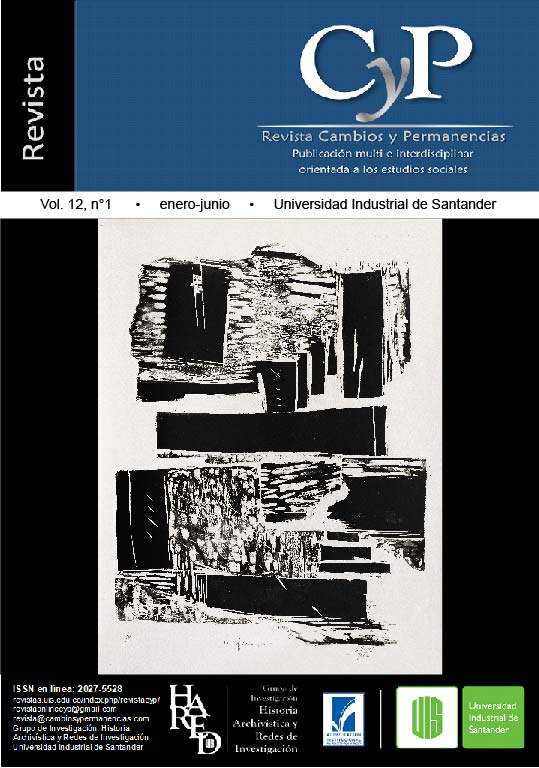Systemic connection of processes during the learning of reading in the first grades of schooling
Published 2021-06-30
Keywords
- Difficulty in learning,
- learning process,
- evaluation of previous knowledge,
- evaluation of the student
How to Cite
Abstract
The concept systemic connection of processes arises from the study of pedagogical intervention to address the reading difficulties of students in the initial stages of their schooling in a Colombian public educational institution. From an experiential introspective approach and a methodological theoretical design that is supported by action research and grounded theory, this qualitative explanatory research exposes some reading difficulties related to the processes of teaching, learning, and reading assessment. The analysis and hermeneutics were carried out by means of the method of constant comparisons and the triangulation of sources. Through theoretical sampling, a performance test was applied to 85 students from first to third and 4 surveys according to the educational role: students, teachers, directors and parents. The study concludes that some difficulties in this stage arise from an incipient exercise of the visual and auditory systems and the poor development of visual, auditory, cognitive and metacognitive abilities and skills. Factors that limit word recognition, speed, fluency, and comprehension. Failures are revealed in the cognitive processes of memory, attention and perception. As well as, the lack of reading, learning, and emotion regulation strategies.
Downloads
References
Bizama, M., Arancibia, B., y Saez, K. (2013). Intervención Psicopedagógica Temprana en Conciencia Fonológica como Proceso Metalingüístico a la base de la Lectura en niños de 5 a 6 años socialmente vulnerables. Estudios pedagógicos, 39(2).
Bravo, L. (2004). La conciencia fonológica como una posible zona de desarrollo próximo para el aprendizaje de la lectura inicial. Revista Latinoamericana de Psicología, 36(1), 21-32.
Cassany, D. (2004). Explorando las necesidades actuales de comprensión; aproximaciones a la comprensión crítica. Recuperado de http://www.xtec.cat/~ilopez15/materials/comprensiolectora/explorandonecesidadesactualesdecomprension.pdf
Castle, A., Rastle, K., y Nation, K. (2018). Ending the reading wars: reading acquisition from novice to expert. Psychological Science in the Public Interest, 19, 5–51. doi:10.1177/1529100618772271
Condemarín, M., Chadwick, M., y Miliciv, N. (2003). Madurez escolar. Madrid, España: Andrés Bello.
Consejo Científico de Educación Nacional de Francia. (s/f). Métodos y manuales de enseñanza para el aprendizaje de la lectura: ¿cómo elegirlos? Recuperado de https://www.reseaucanope.fr/fileadmin/user_upload/Projets/conseil_scientifique_education_nationale/Manuels_VDEF_ES.pdf
Dehaene, S. (2014). El cerebro Lector. Argentina: Siglo Veintiuno editores.
Dehaene, S. (2015). Aprender a leer. De las ciencias cognitivas al aula. Buenos Aires, Argentina: Siglo Veintiuno Editores.
Departamento Nacional de Planeación-DNP. (2019). Pacto por Colombia, pacto por la equidad Plan Nacional de Desarrollo 2018-2022: Retos, estrategias y metas. Bogotá, Colombia: DNP.
Flórez, R., Restrepo, M., y Schwanenflugel, P. (2009). Promoción del alfabetismo inicial y prevención de las dificultades en la lectura: una experiencia pedagógica en el aula de preescolar. Avances en Psicología Latinoamericana, 27(1), 79-96.
Glaser, B., y Strauss, A. (1967). The discovery of grounded theory. Chicago, EE. UU.: Aldine Publishing Company.
Instituto de Estadística de la UNESCO. Universidad Industrial de Santander. (2017). Más de la Mitad de los Niños y Adolescentes en el Mundo No Está Aprendiendo. Ficha informativa del UIS (46).
Jolibert, J., y Sraiki, C. (2009). Niños que construyen su poder de leer y escribir. Buenos Aires, Argentina: Manantial.
Kemmis, S., y McTaggart, R. (1988). Cómo planificar la investigación-acción. Madrid, España: Laertes.
Lyon, G., Fletcher, J., Shaywitz, S., Shaywitz, B., Torgesen, J., Wood, F., Schulte, A., y Olson, R. (2001). Rethinking Learning Disabilities. Recuperado de https://www.researchgate.net/publication/242685581_Rethinking_Learning_Disabilities
National Reading Panel-NRP. (2000). Report of the National Reading Panel: Teaching children to read. EE.UU.: National Institute of Child Health and Human Development.
Neisser, U. (1976). Psicología cognoscitiva. México: Trillas.
Pozo, J. (1990). Estrategias de aprendizaje. En C. Coll, J. Palacios, y A Marchesi (Comp.), Desarrollo psicológico y educación, Il. Psicología de la Educación. Madrid, España: Alianza.
Pozo, J., y Monereo, C. (1999). El aprendizaje estratégico: enseñar a aprender desde el currículo. Madrid, España: Santillana.
Purcell-Gates, V., Degener, S., Soller-Gallart, M., y Jacobson, E. (2001). Impact of authentic adult literacy instruction on adult literacy practices. Reading Research Quarterly, 37, 70-92.
Sánchez Vincitore, L. (2018). Creación de una colección de libros decodificables para la práctica lectora inicial en el idioma español. Ciencia y Educación, 2, 163-172.
Scarborough, H. S. (2001). Connecting early language and literacy to later reading (dis)abilities: Evidence, theory, and practice. In S. Neuman, y D. Dickinson (Eds.), Handbook for research in early literacy. New York, EE. UU.: Guilford Press. Recuperado de https://johnbald.typepad.com/files/handbookearlylit.pdf
Secretaría de Educación Pública-SEP. (2014). Estándares Nacionales de Habilidad Lectora. Estándares de lectura. Recuperado de https://www.gob.mx/sep/acciones-yprogramas/estandares-nacionales-de-habilidad-lectora-estandares-de-lectura
Solé, I. (1998). Estrategias de lectura. Barcelona, España: Graó.
Soler, M. (2003). Lectura dialógica. La comunidad como entorno alfabetizador. En: A. Teberosky, y M. Soler (eds.), Contextos de alfabetización inicial (pp. 47-63). Barcelona, España: Horsori.
Tapia, M. (2017). La concepción simple de la lectura en español. Predictores de la comprensión lectora (Tesis doctoral). España: Universidad de Navarra.
Tapia, M. (2019). Identificar el riesgo en lugar del fracaso. Recuperado de https://delaevidenciaalaula.wordpress.com/2019/10/08/identificar-el-riesgo-enlugar-del-fracaso
UNESCO (2016). Declaración de Incheon y Marco de Acción para la realización del Objetivo de Desarrollo Sostenible 4. Recuperado de http://www.unesco.org/new/fileadmin/MULTIMEDIA/FIELD/Santiago/pdf/ESPMarco-de-Accion-E2030-aprobado.pdf

